#shevat
Explore tagged Tumblr posts
Text

Danez Smith // "I'M GOING BACK TO MINNESOTA WHERE SADNESS MAKES SENSE" [ID in alt text]
1K notes
·
View notes
Text
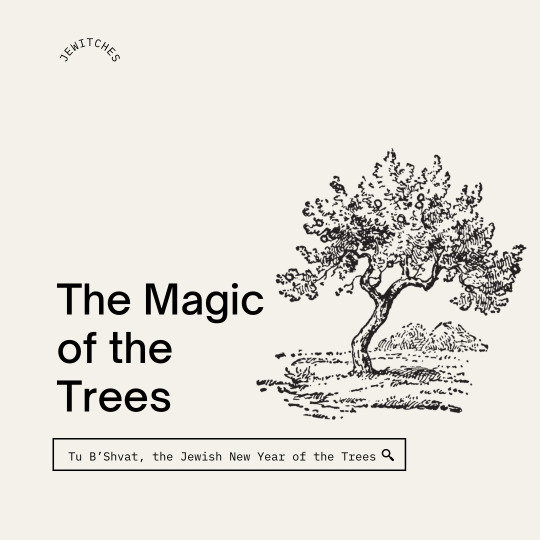
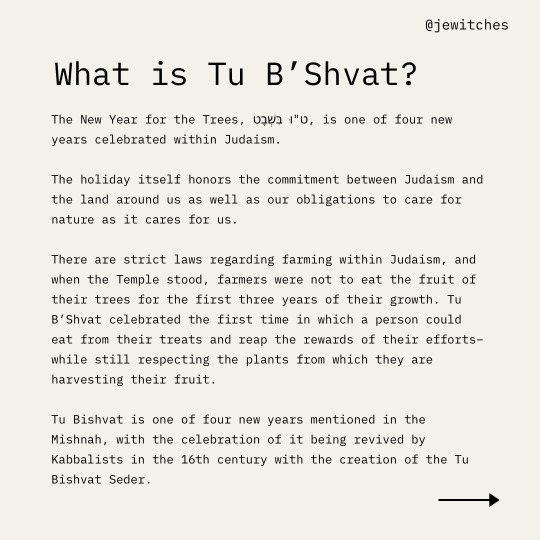

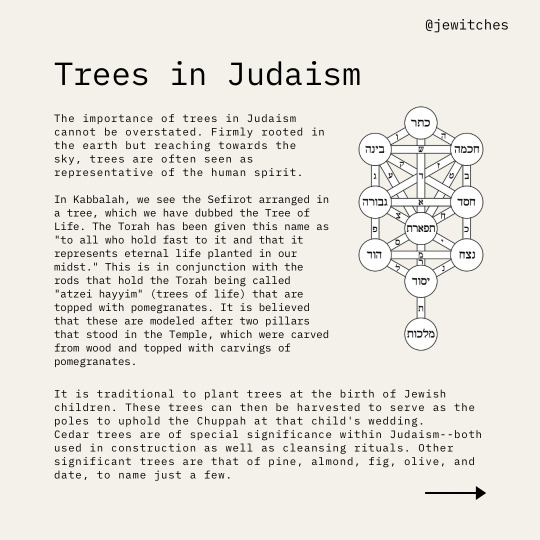
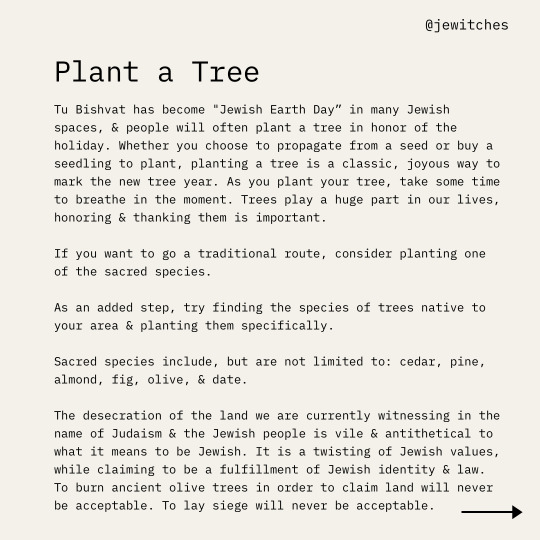
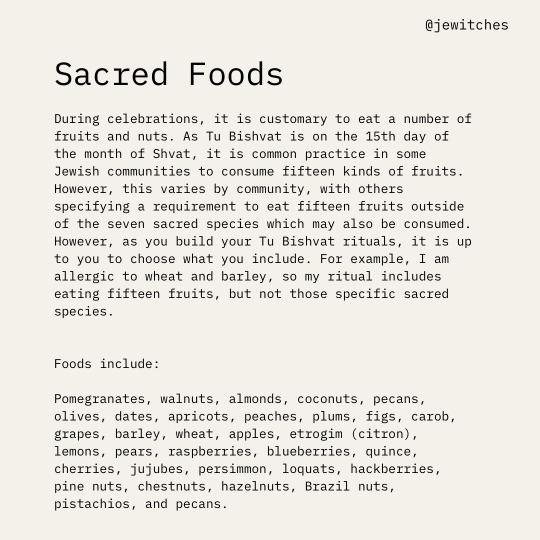
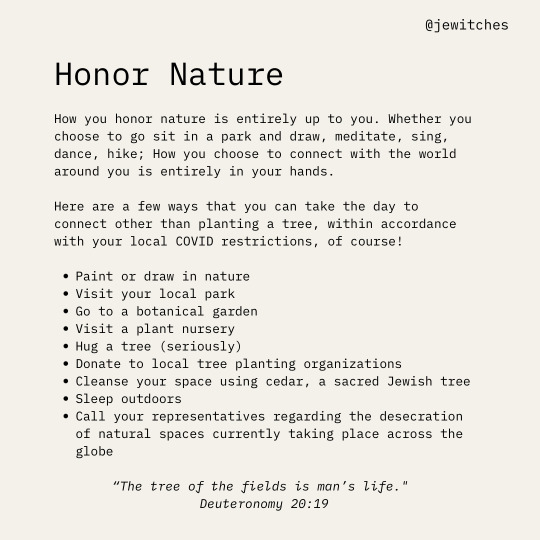

Did you know that Judaism has a New Year of the Trees?
I see the ancient groves of olive trees and my heart breaks, it twists in my chests to see our community say it’s worth it to flood the land with sea water, to salt the earth, and destroy one another, somehow claiming this in the name of Judaism.
Judaism teaches magic in the trees; teaches that the roots ground us, that the branches bring us to HaShem and HaShem to Us. There is a famous Jewish idea that we are not in the business of going to heaven but in bringing Heaven to us.
Tu B’Shevat is this week 🕯️🌱 how will you be celebrating?
Read the blog
593 notes
·
View notes
Text
Hello! I created this blog to share my joy in the Jewish calendar and Jewish history and Jewish diversity and complexity and humor and resilience.
Anon asks are off because this is a jumblr blog and I trolls aren't welcome. But asks are very much on. Please send me posts you think would fit the blog or Jewish anniversaries you think are worth commemorating here (and remember that the talmud tells us that whoever cites their sources saves the world, see Megillah 15a line 20).
#jumblr#jewish calendar#jewish holidays#jewish#judaism#jewish history#today's jewish holiday#adding month tags here to make past posts easier to find#nisan#iyyar#sivan#tammuz#av#elul#tishrei#cheshvan#kislev#tevet#shevat#adar#shabbat#erev shabbos
24 notes
·
View notes
Text
My Tu Bishvat Moments. 🌷💕✨
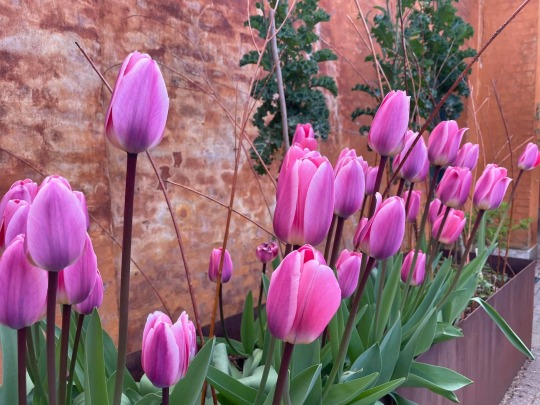






0 notes
Text
Kavanah & Tefillah - Tips for Powerful Davening (19 Shevat)
Tefillah (prayer) is one of the most central components of the Jewish faith. It is a way for us to reach out to our creator, to thank Him for what He has given us and to ask Him for anything we still need. Hashem appreciates it deeply when we take the time out of our day to talk to HIm, and truly wants to answer as many of our prayers as possible, though sometimes in unexpected ways. So, if it ever seems like your prayers aren’t being answered, know that Hashem is still listening no matter what, but try some of these tips to get the ball rolling a little faster!
Start with Gratitude. Who would you rather do a favor for? Someone who starts their request with how grateful they are for the things you do for them, or someone who just asks you for something right off the bat? Probably the former, and Hashem feels the same way. Gratitude is of utmost importance in Jewish law. Our people’s name, Yehudim, comes from the same shoresh (root word) as the word for gratitude, so Hashem values gratitude very highly. He is more likely to answer the prayers of those who are grateful for what he does, as that is His way of teaching us to be more grateful. Therefore, next time you have a request for Hashem, you should start by thinking about all the blessings Hashem has already bestowed upon you.
Be Less Specific. Imagine that someone is davening to get into a specific university which has the highest rate of acceptance into medical school… but really their destiny is to be an artist. Hashem may not grant this prayer to be accepted into that university, because Hashem knows that this person’s true path lies elsewhere. If you are praying for something overly specific, the same thing may happen to you. Instead, be more broad with your prayers. If, in that situation, someone prayed to simply have a successful future instead of to get into a specific university, Hashem would get their art career started and grant them success quickly. Next time you are about to pray for something specific, pray for your end goal instead, and since Hashem always knows what you need, Hashem might take you there in an unexpected way!
Be Selfless. Selflessness is another Jewish value (perhaps the most important one in the entire Torah) which Hashem cares deeply about. It is a well known fact that davening is more effective when it is done for someone else. As such, it can be helpful to daven for things that benefit others, or to have your loved ones daven for you as Hashem is more likely to grant selfless prayers. This is also why your prayers are much more likely to be granted if doing so would help you fulfill a mitzvah. Hashem only wants the best for His people, and prefers those who feel the same way.
Daven Every Day. The best way to improve your relationship with anyone is to talk to them as often as possible, and the same is true for Hashem. Since the way you talk to Hashem is by davening, you should daven every day to become closer with Him. Just as you would be more likely to do a favor for a friend than for an acquaintance, Hashem also prefers to grant prayers to people who take the time to know Him more deeply. So, if you feel like your tefillah is not being answered, try to make a habit of talking to Hashem every single day. Besides, who could be a better friend than Hashem?
Take Action! There is an old Jewish story about a man who davened every single day to win the lottery. His davening was perfect! He expressed gratitude towards Hashem, and prayed with the utmost intention and extreme consistency! He does this every day for months, and eventually becomes upset with Hashem for not letting him win the lottery. Eventually, he calls out to Hashem, saying “what’s the deal? I’m a good Jew, I davened perfectly, I’ll donate some of the money as tzedakah, what more do you want from me!?” Hashem’s response? “BUY A LOTTERY TICKET!”. You see, you can daven and daven and daven for years, but if you never take any action towards achieving your goals, nothing will ever happen. So, buy the lottery ticket! If there’s something you’ve been davening for for a long time and it has yet to come true, you need to be the first one to take action to get it done.
If you take the time to put all of these tips into action, not only will you strengthen your relationship with Hashem, but you will also be practicing some of the most important Jewish values. If you become a grateful and selfless person who is deeply connected to Hashem, you will not only be a better person, but you will have the added benefit of getting more of your prayers answered!
Tell me in the tags: Do you have any other advice for more effective davening? Do you have any inspiring stories to share of your prayers being answered?
Jew Joke:
I would drop to my knees twice a day begging Hashem to do anything that would make my life easier.
So He gave me knee pads.
23 notes
·
View notes
Text

#mine#I'm allergic to Kiwi but whatever it goes high because it's gooey and awesome#fuck this is making me crave fruit I can't wait until 15th of shevat I have an excuse to splurge on some fruit
6 notes
·
View notes
Text
Nearly finished watching someone play xenogears, so I might become insufferable should I decide to talk about what I feel about it
#xenogears#watching a letsplay because i couldnt concentrate for long enough#which is why im worried about olaying xenoblade x but i could cheat if my only goal is do affinity stuff#and then play it properly (only cheat extra affinity because i dont enjoy that mechanic)#i might play it myself eventually. however im not sure#i want to play star ocean 2 and baten kaitos this year. as well as the pokemon dlc#i just had the bit where they attacked merkaba so chilling with shevat
2 notes
·
View notes
Text
Sun Feb 12- Mon Feb 13, Tu B'Shevat, the Jewish Arbor Day
[et_pb_section fb_built=”1″ admin_label=”Hero�� _builder_version=”4.25.2″ _module_preset=”74c69059-8e69-4122-b1e6-dfeabf6c5711″ use_background_color_gradient=”on” background_color_gradient_stops=”rgba(0,0,0,0.6) 0%|rgba(0,0,0,0.9) 100%” background_color_gradient_overlays_image=”on” background_color_gradient_start=”rgba(0,0,0,0.5)” background_color_gradient_end=”rgba(0,0,0,0.75)”…
0 notes
Text

the (Jewish) New Year of Trees
FEBRUARY 12, 2025
THE JEWISH NEW YEAR...OF TREES?
You are probably familiar with Rosh Hashanah, or the Jewish New Year, which takes place in the fall. But did you know that there are four new years in Judaism...one of which celebrates the “birthday” of trees?
Tu Bishvat is somewhat of a Jewish equivalent to Earth Day. It’s observed by religious and secular Jews alike, and often used to highlight environmental and natural causes. It’s also traditional to plant trees in Israel on this holiday.
SPARKNOTES HISTORY LESSON
The origins of Tu Bishvat can be traced back to ancient Israel. This is because the Torah warned the Israelites that, upon entering Israel, the fruits from a tree should be regarded as “forbidden” for the first three years of the tree’s life. After five years, the fruit could be consumed.
However, this prohibition created a conundrum for the farmers: how do you mark the “birthday” of a tree...let alone all the trees in the Land of Israel?
This is how the rabbis eventually agreed to mark a date as the “birthday” for all trees. This date was the 15th of the Hebrew month of Shevat, or Tu Bishvat.
TU BISHVAT UNDERSCORES THE IMPORTANCE OF THE LAND OF ISRAEL TO THE JEWISH PEOPLE
Tu Bishvat is one of many Jewish land-based holidays that highlight the strong territorial links between the Jewish people, identity, culture, tradition, Judaism, and Eretz Israel, or the Land of Israel.
The Jewish people became a nation in the Land of Israel, some 3000 years ago. Like other ancient nations, Jews have long revered their ancestral homeland, including its natural elements. It’s for this reason, for example, that the Seven Species -- wheat, barley, dates, grapes, figs, pomegranates, and olives -- feature so prominently in Judaism and Jewish culture. Many Jewish holidays assign special spiritual significance to fruits native to the Land of Israel, like the lulav and etrog during Sukkot.
Unfortunately, after centuries of foreign conquest, the Land of Israel, once the land of “milk and honey,” underwent a process of desertification that depleted the local ecology due to man-made erosion and malaria.
Since then, however, Israelis have gone through great lengths to rehabilitate the environment, restore its water, and even bring long-extinct ancient trees like the Judean date palm back to life.
TU BISHVAT IN MODERN ISRAEL
Though Tu Bishvat is considered a “minor” Jewish holiday, it’s enthusiastically celebrated by religious and secular Israelis alike. Every year, over a million Israelis participate in tree-planting activities during Tu Bishvat.
The tradition of planting trees in Israel on Tu Bishvat dates back to the late 19th century. It likely originated with Rabbi Ze’ev Yavetz, who, in 1890, took his students to plant trees at a moshav (Israeli cooperative agricultural community). This new tradition was quickly adopted by the Association of Hebrew Teachers in Ottoman Palestine in 1906, which made it mandatory for schools to participate in tree-planting activities on Tu Bishvat.
In addition to planting trees, many Israelis observe a “Tu Bishvat seder,” reviving a Kabbalistic tradition from the 16th century.
Finally, Tu Bishvat is used as a day to highlight important environmental and ecological causes.
THE STORY OF THE JUDEAN DATE PALM: WHERE ANCIENT ISRAEL MEETS MODERN ISRAEL
The Judean date palm is a plant native to Eretz Israel. In ancient times, its fruit was not only a staple in Israel, but it became a spiritual symbol during the period of the Kingdom of Judah (930-587 BCE), and was even used medicinally. It is also mentioned multiple times in the Torah and adorned ancient Jewish currency.
But by the 13th century, thanks to the environmental abuse of foreign empires, the Judean date palm became fully extinct.
In 1963, Israeli professor Yigal Yadin uncovered date palm seeds from ~155 BCE-64 CE preserved in an ancient jar while carrying out archeological excavations at Masada.
Then, in 2005, scientists at the Arava Institute for Environmental Studies were able to sprout several seeds. Three of the seeds were planted, and 8 weeks later, one of the seeds sprouted. The plant is known as “Methuselah,” named after the oldest-lived person in the Hebrew Bible.
"And you, mountains of Israel, you shall give forth your branches and you shall bear your fruit for my people Israel, for they shall soon come."
Talmud Sanhedrin 98a
ENVIRONMENTAL COMMITMENT ON BIRTHRIGHT ISRAEL PROGRAMS
In keeping with the spirit of the Jewish dedication to the preservation of the Land of Israel and the environment, Birthright Israel is one of the Israeli organizations taking important steps to pursue a sustainable and environmentally friendly future through Greening, their dedicated sustainability initiative. Some initiatives within Greening include:
Successful completion of the pilot project offsetting carbon emissions through tree planting, with plans to scale up to 5,000-10,000 trees annually.
The Birthright Israel Onward Green Energy cohort facilitating internships for 30 US college students in Israeli environmental companies.
Birthright Israel Excel participants engaging in sustainability internships with prominent organizations, contributing to real-world impact.
Growth and development of specific “Green” modules for participation on 10-day trips.
Contributing to a network of greening sites along key trip routes, highlighting environmental sustainability while seamlessly integrating Jewish content.
You can learn more about the Israeli ecosystem and experience Israel for FREE on Birthright Israel.
rootsmetals
This evening marks the beginning of Tu Bishvat, also known as the “New Year of Trees,” one of the many holidays proving the ancient connection between the Jewish people and Israel. To sign up for your free trip and learn more about Israel, visit the link in my bio. Chag sameach!
28 notes
·
View notes
Text


Imagine living a lonely 500 yrs unaging and then two of your friends suddenly show up again & dont recognize you. One who sacrificed herself to save people & the other who turned traitor, releasing a PoW, & caused immense destruction, killing millions before disappearing forever.
Poor Elly was probably worried and nervous the whole time she was in Shevat. If she's in your party when you talk to Yui, when Fei & Yui start talking about Lahan, she hides from her, runs to the other side of the room and faces the wall 🥺
#xenogears#fei fong wong#elehayym van houten#Zephyr Xenogears#my art#PW ep5#I started this sometime in Sept'23 and the other two panels in Jan'24. Finally finished!
48 notes
·
View notes
Text



Sax-Zim Bog, Minnesota
55 notes
·
View notes
Text
Xenogears - The Wind Calls to Shevat in the Blue Sky
99 notes
·
View notes
Text
Tu BiShvat: What and How
By Naftali Silberberg
The 15th of Shevat is the New Year for Trees, known as Tu b'Shevat.
According to Biblical law, there is a seven year agricultural cycle, concluding with the Sabbatical year. When the Holy Temple stood in Jerusalem, on years one, two, four and five of this cycle, farmers were required to separate a tenth of their produce and eat it in Jerusalem. This tithe is called Maaser Sheni, the Second Tithe, because it is in addition to the (two percent which must be given to the Kohain, and the) ten percent which is given to the Levite. On the third and sixth years of the cycle, instead of the owners eating the Maaser Sheni in Jerusalem, they gave this second tithe to the poor, who were permitted to consume it wherever they wished.
[On the Sabbatical year, no tithes are separated. All produce which grows during this year is ownerless and free for anyone to take.]
It was therefore of vital importance to ascertain when the new year started for produce. Our Rabbis established that a fruit which blossomed before the 15th of Shevat is produce of the previous year. If it blossomed afterwards, it is produce of the "new year." [By comparison, grains, vegetables, and legumes have the same New Year as humans, the 1st of Tishrei.] Why is this so? In the Mediterranean region, the rainy season begins with the festival of Sukkot. It takes approximately four months (from Sukkot, the 15th of Tishrei, until the 15th of Shevat) for the rains of the new year to saturate the soil and trees, and produce fruit. All fruit which blossom beforehand are a product of the rains of the previous year, and are tithed together with the crops of the previous year.
Although this day is Rosh Hashanah for trees, we attach special significance to this holiday because "Man is [compared to] the tree of the field" (Deuteronomy 20:19). Through cultivating strong roots – faith and commitment to G‑d – we produce many fruits—Torah and Mitzvot.
Observances and Customs
On this day it is customary to partake of the fruit with which the Holy Land is praised (Deuteronomy 8:8): olives, dates, grapes, figs and pomegranates. If tasting any of these fruit for the first time this season, remember to recite the Shehecheyanu blessing. (A blessing recited on joyous occasions, thanking G‑d for "sustaining us and enabling us to reach this occasion." This blessing is recited before the standard "Ha'etz" blessing recited on fruit.)
Due to the festive nature of the day, we omit the Tachanun sections (petitions for forgiveness and confession) from the prayers.
Source: Chabad.org
#tu bishvat#jumblr#copypasta-ing this article into tumblr because I know people here tend not to click links
130 notes
·
View notes
Text

Commission Round-Up! 10/?
Fire Emblem GBA-styled Portraits for Fei Shevat and Liu Dahcris over on Kofi! Thank you so much for your support!
I still have slots open for commissions if anyone is interested and would like portraits for their OC's or anything at all! See the pinned post or go to my Kofi for more details!
#pixel art#ドット絵#pixel artist#fire emblem#commission#artists on tumblr#small streamer#oc art#ffxiv#ffxiv art
66 notes
·
View notes
Text
Torah & More - Mishpatim: How Kashrut Sets Us Apart
In parshat Mishpatim (this week’s parsha), Kashrut is introduced for the first time, through the prohibition against boiling a calf in its mother’s milk. This commandment will occur two more times in the Torah and is the basis for the Rabbinic prohibition against mixing any dairy product with any meat. Although plenty of other cultures have dietary restrictions, none are quite like this one, as although banning specific foods is hardly rare (for example, even goyim don’t eat ants), banning a mixture of two foods is extremely uncommon. So, what is the significance of this key kosher law?
Every other culture that has a taboo against mixing foods together has a reason behind the taboo. For example, in Hinduism and Jainism, certain foods are not eaten together because doing so is believed to cause harm during digestion. Medieval Christians also believed this about mixing hot and cold foods. However, the Torah never cites a digestive concern behind the prohibition against mixing milk and meat. This is because Jews are the only people which have a prohibition against mixing foods for a purely spiritual reason (because Hashem commanded it) rather than a practical one. In fact, this can also be said about other kosher laws. It is perfectly safe to eat pigs, many insects, and birds of prey for example, but we don’t, and the only reason we don’t is because Hashem said not to. While most other cultures’ dietary restrictions are based on social taboos or health risks, ours are of divine origin.
So, when you refuse to mix milk and meat, you are not simply following the advice of your ancestors or trying to avoid adverse health effects. You are displaying the Jewish virtue of trusting in Hashem, even when it seems like there is no logical reason to. The reason the law against boiling a calf in its mother’s milk is stated three times in the Torah is to remind Jews as often as possible just how important it is to listen to all of Hashem’s commandments, even the ones that don’t immediately make sense; a lesson we can apply to all aspects of Jewish life.
Tell me in the tags: Are there any mitzvot you follow even though you may not understand the logic behind them? Are there any other lessons you can share from parshat Mishpatim? What is your favorite part of the parsha?
Jew Joke:
Congregant: “Rabbi, I almost broke kosher last night!”
Rabbi: “Oh no, what happened?”
Congregant: “I ordered a soup at a restaurant and almost forgot to tell them to hold the bacon!”
Rabbi: “B”H you remembered! What kind of soup was it?”
Congregant: “Clam chowder.”
18 notes
·
View notes
Text
15 Shevat 5785 (12-13 February 2025)
Happy birthday to the trees. It's the new year for trees.
#today's jewish holiday#jewish holidays#jewish calendar#judaism#jumblr#tu b'shevat#tu bishvat#tu b'shvat#trees#🌴#🌲#🌳#🌝
12 notes
·
View notes